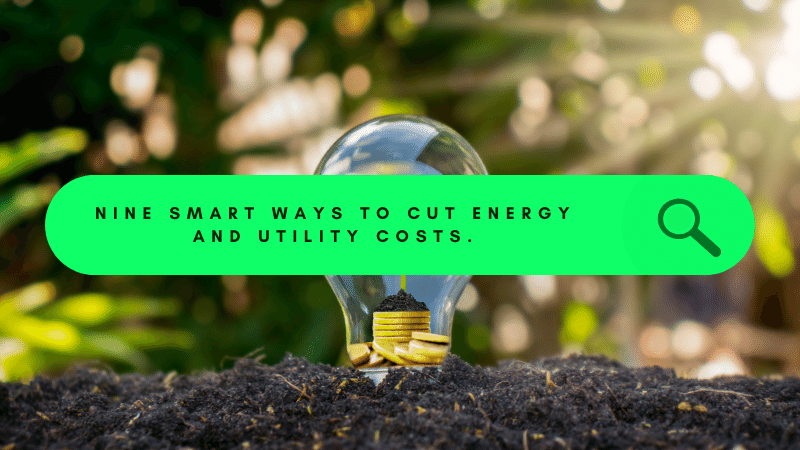Energy efficiency is one of the top factors that add to economic stability and sustainability. Less energy consumption for daily tasks means big cuts in energy costs. They all add up to hundreds of dollars in savings per year.

Today we look into some best practices to save on costs from using your utilities. Many factors come into play: lessened energy consumption, being aware of your energy use, and energy efficiency at home. Another factor here is more exploration of the vast possibilities of solar power.
There are also unexplored ways that add up to bigger cost savings. You can use public funding scheme-related savings from off-peak rates and capacity-building support. You can use practical home savings tips from smart plugs, power boards, and home insulation. There are also ways from regular energy and savings comparisons, and using appropriate energy plans.
We aim to provide a thorough guide for regulating energy consumption and getting savings from its controlled use. This can lead to major cuts in costs and spending. Through these practices, we can also contribute to a more sustainable existence. It’s all about saving more money and being more green.
1. Understand Your Energy Usage
Being aware of your personal energy use is the first major step in cost-cutting from utilities and energy consumption. Lessening your dependence on major utilities not only saves you money. You also contribute to environmental sustainability.
One of the most effective ways to do this is by using energy audits to track your usage. It makes you more aware of how much energy you consume. From here, you can make adjustments and anticipate how much more you can cut and save.
When you are aware of how much you use and how much you can save, it will be easier to devise plans to adjust energy usage. There are many small ways you can do this. You can seal off doors and window corners to avoid cooling or heating leaks. You can regulate the thermostat and heating system and choose more energy-efficient lights, such as LEDs.
Energy awareness and small usage changes all add up to substantial energy savings. It makes you more conscious of saving money and being more proactive at home. You turn off lights when unused, fix leaks, and use washing machines and dishwashers with single full loads for maximisation. Another consideration is unplugging unused appliances when not used, eliminating phantom energy. Awareness is the start of being more energy-conscious.
2. Using Energy-Efficient Appliances and Electronics
Energy-efficient appliances and electronics are a great investment for long-term savings. They do the same tasks and functions using less energy. This is another step towards reducing greenhouse gas emissions. When combined and used long-term, the savings you gain are also substantial. Your bills won’t be as heavy on the budget either. It’s a twofold win when you start being aware of these details and apply them to your daily energy usage.
Energy audits prove to be beneficial for homeowners. It instils discipline and a cost-saving mindset. Even small details such as decreasing standby power usage from plugged but not used devices become natural. In households where all devices are always plugged in, this can cut costs in the total bill. It also instils cost-saving discipline. The difference between your bills before and after will make you realise these steps are worthy of your time and effort.
3. Exploring the Benefits of Solar Power
Solar power in Australia can add another sustainable energy source to your homes. It also reduces dependence on large usage of everyday energy needs. It is already a proven energy source enjoyed by many homes throughout the country. The savings are quite significant as well.
The initial costs for establishing a solar power system may be expensive for some. But this translates into a good investment over time. Solar power provides sustainable, green energy that doesn’t add to greenhouse gas emissions. It lessens your dependence on the energy grid. It also gives you long-term savings.
What’s more, the Australian government provides many tariffs and incentives for solar power use. They further add to the cost-cutting capabilities of solar power. It is a rewarding investment that keeps on giving.
For remote and rural areas, solar power provides reliable and sustainable green energy with all these other benefits. It gives households independence from national energy grid structures.
Exploring the wide possibilities of solar power enhances your energy choices. It is a green source that has many beneficial advantages to your household. It is a serious consideration for your journey to utility and energy savings.
4. Smart Use of Washing Machines and Dishwashers
Both washing machines and dishwashers are important appliances that give full convenience to us. But their repeated use also eats up much energy use. When you are more aware of your energy and utility costs, you start practising smart tips to cut costs.
For one, maximising usage contributes to smaller energy and utility bills. Full loads for both appliances scheduled at convenient times will cut down on electricity, water, and cleaning supply costs.
You can also use modern washing machines and dishwashers with high energy-efficiency ratings. A 3.5-star efficiency rating is the minimum requirement if you want to invest in these beneficial appliances.
There are also minor adjustments that add to these savings. They may be more beneficial to your use. Using cold water in your washing sessions avoids extra energy use for heating, and can reduce wear and tear on clothes. Use eco-friendly detergents that are not harsh against clothes and the environment. Instead of using your dryers, let clothes air dry. Your clothes will sustain less sun and ultraviolet damage and save on energy use too.
These are gentler ways to wash clothes and prolong their fabric quality and prints. Do this along with full load maximisation for better results.
5. The Advantages of Off-Peak Rates
Off-peak rates provide a way to use energy at lower prices. Being aware of these times to use energy can help you schedule other energy-related tasks. They can add up to your total savings per month. Many activities that use appliances are easy to schedule during off-peak rates. You must take advantage of these schedules.
The strategic approach to scheduling other tasks during off-peak rates will help you maximise energy savings. You can schedule appliances such as dishwashers and washing machines during times of off-peak rates. You can add your other energy-saving practices to these appliances at the same time for maximum results.
Energy usage awareness is another step towards maximum energy savings. You can use smart metre apps, trackers, or solar panel apps to make you more aware of energy consumption. Once you are more conscious of these helpful tools, it is easier to track and adjust your usage habits. You don’t have to sacrifice your energy needs.
You can combine off-peak rate usage with other practices to maximise your energy and utility cost-cutting. It is a sustainable way to use energy without sacrificing the quality of your life or your needed energy.
6. The Benefits of a Water-saving Shower Head
Water-saving shower heads help with lower energy consumption because they limit the flow rate. It results in less water usage with no changes to your shower quality. It’s easy to install them on your showers. But they are a long-term investment that reduces water usage each time you shower. Reduced water use also corresponds to lower heating utility bills, with less water to heat.
This step is one of many habits you can incorporate into your daily living. They become ingrained in your habits along with your energy awareness. These all add up to significant savings on your utility bills. They also become a regular part of your cost-cutting savings.
7. Smart Plugs and Power Boards For Monitoring Energy Use
Smart plugs and power boards are additional tools for controlling excess energy waste. It eliminates standby energy when appliances and devices are still plugged in but not in use. They are part of smart home energy management to prevent energy waste when these devices are not in use.
You can use these energy control devices along with energy monitoring apps and trackers. They are effective in controlling and managing home energy. Many of these appliances are not easy to track daily. Monitoring and tracking them is an effective strategy to maximise energy savings, down to each appliance at home that use energy.
Your home lighting appliances are some of the most common beneficiaries of these control and tracking devices. Lights can be on for a long time without any real use. Controlling the times when you turn them on and off will avoid extra energy waste. The savings are also significant when they are only turned on when you need them.
Energy-saving power strips are also related energy energy-saving devices that control energy waste. They control the scheduling of all connected devices and make monitoring and management easier. You can use them with smart plugs and power boards to make an effective power management suite at home. Take advantage of their combined features to create a power-saving and management routine for your convenience.
8. The Benefits of Proper Home Insulation
The proper insulation of your home will maximise your energy usage. For one, you don’t waste any cooling and heating energy. You only use up the right amount of energy for heating and cooling needs when you use sufficient levels of energy. It also makes your cooling and heating appliances more effective, which regulates their energy use.
As mentioned, an energy audit is a very helpful method to determine where you need proper insulation. When you have proper insulation throughout your home, you save on energy costs for heating and cooling all spaces. You don’t use up so much energy and do not strain or put stress on your appliances.
Proper insulation also includes weatherstripping and sealing of all house corners. This makes even temperature controls for both heating and cooling purposes. Not only do you avoid excessive energy use, but you also don’t strain your appliances. The result is even temperature comfort indoors. Have we mentioned that this prolongs your appliances as well?
Many people might not consider a holistic approach to home insulation. But the appropriate application of the tips and strategies we’ve discussed will equal savings and lower energy bills. Your appliances are also more efficient and do not experience unnecessary strain and stress. Your indoor comfort is more consistent and balanced throughout.
9. Why Constant Energy Plan Comparisons Are Helpful
Energy plans help you manage and regulate your household’s energy and utility usage. You can save anywhere from $120 to $400+ per year on energy bills. This goes towards electricity and has bills.
You can use the comparison and switch process from Energy Made Easy. This is an energy plan list provided by the Australian government. They want you to maximise your energy use. and by proper usage, you get cost-cutting benefits.
Their easy-to-use website allows you to enter your energy usage and location. The website uses these details to provide you with energy plans that are applicable to your situation. You can look up, compare, and switch energy plans to get the best rates applicable to you.
Through this regular practice, you become entitled to better energy rates and incentives available to your area. You get the best energy deals and the right pricing for your gas and electricity needs.



